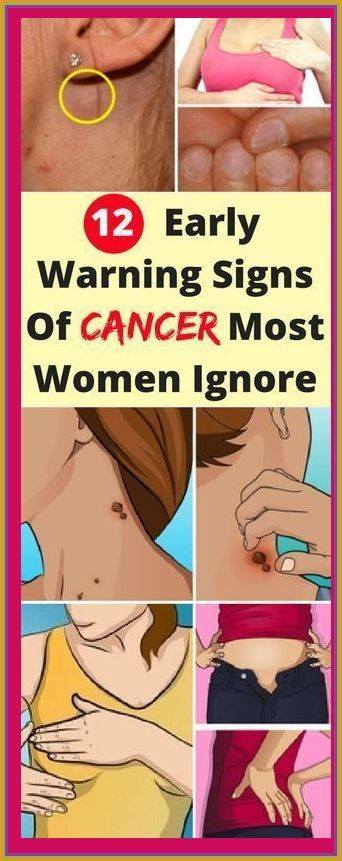
Cancer is a major global killer, and early detection is a powerful weapon against it. For women, noticing small body changes can decide between timely treatment and a late diagnosis. Not every symptom means cancer, but being aware of early warning signs can lead to timely medical help. Here are 12 symptoms women should never ignore.
1. Unexplained Weight Loss Losing weight without trying can be a sign of underlying health problems. Sudden weight drops without diet or activity changes may point to cancers like stomach, pancreas, or lung cancer. The body uses a lot of energy fighting these diseases, often causing unexplained weight loss. If you’re losing weight for no reason, see your doctor.
2. Skin Changes Our skin shows our health, and sudden changes shouldn’t be ignored. Watch for mole or spot changes, like size, color, or texture, which could signal melanoma. Unexplained rashes, redness, or non – healing lesions may also mean skin cancer. If in doubt, see a dermatologist for any suspicious spots.
3. Breast Changes Breast cancer is common in women, so being alert to any changes is crucial. Lumps, discomfort, or size/shape changes can be warning signs. Regular self – exams are important, and annual mammograms after a certain age can catch problems early. If something seems wrong, trust your gut and get it checked.
4. Chronic Fatigue Feeling tired is normal, but if exhaustion doesn’t improve with rest, take notice. Chronic fatigue can be a symptom of leukemia or other blood cancers. It may feel like you’re carrying a heavy load even after a good sleep. If this fatigue persists, consult a healthcare pro.
5. Digestive and Urinary Changes Your digestive and urinary systems can give early cancer warnings. Persistent diarrhea, constipation, or blood in the stool may point to colon cancer. Blood in the urine could mean bladder or kidney cancer. These changes are often subtle at first, so pay attention to your body’s patterns. If something seems off, schedule a medical consult.
6. Persistent Pain Lingering or unexplained pain could signal an underlying issue, including some cancers. Back pain, abdominal discomfort, or joint pain shouldn’t be ignored, especially with no clear cause. Bone cancer and other malignancies can show as unexplained aches. Listen to your body and don’t ignore chronic discomfort.
7. Abnormal Bleeding Bleeding outside your period or after menopause isn’t normal and should be checked right away. It can be a symptom of cancers in the cervix, uterus, or ovaries. While there may be non – cancer reasons, it’s better to be safe. Early detection of these cancers greatly improves treatment results.
8. Persistent Cough A cough that won’t go away, especially with blood, could mean lung or throat cancer. A long – lasting cough may seem harmless, but pay attention if it lasts weeks or changes in intensity. Smoking or pollutant exposure increases risk, so don’t ignore respiratory symptoms.
9. Enlarged Lymph Nodes Lymph nodes in the neck, underarms, and groin often swell due to infections. But if they stay enlarged without an obvious cause, it could be a sign of lymphoma or leukemia. Persistent or growing swollen lymph nodes should always be checked by a doctor.
10. Non – healing Sores Non – healing sores or lesions, especially in sun – exposed areas or the mouth, can point to skin or oral cancer. Notice any unusual skin discoloration or rough patches. Early detection is key, so don’t delay checking unusual sores.
11. Digestive Symptoms Persistent bloating, sudden loss of appetite, or trouble swallowing could signal cancers in the stomach, esophagus, or ovaries. While these symptoms can be from less serious issues like indigestion, if they keep happening, get medical attention. Early intervention can make a big difference.
12. Nail Changes Nails can show your overall health. Watch for thickening, unusual discoloration, or dark streaks under the nails, which may indicate skin or lung cancer. While nail changes are often harmless, big or sudden ones should be evaluated.
Each symptom may have non – cancer causes, but don’t ignore them. Early detection saves lives, and trusting your instincts when something’s wrong is important. Routine check – ups, a healthy lifestyle, and knowing these warning signs can help you take care of your health.
When it comes to cancer, knowledge is power. By staying alert to these early signs and seeking medical advice when something’s off, you can take steps for early detection and treatment. Encourage your loved ones to do the same – it could save a life.
Remember, it’s not about being scared, but about listening to your body and acting when needed. Share this article with friends and family to spread awareness. Together, we can make early detection the norm and save lives every day.
Stay healthy, stay informed, and always put your well – being first.